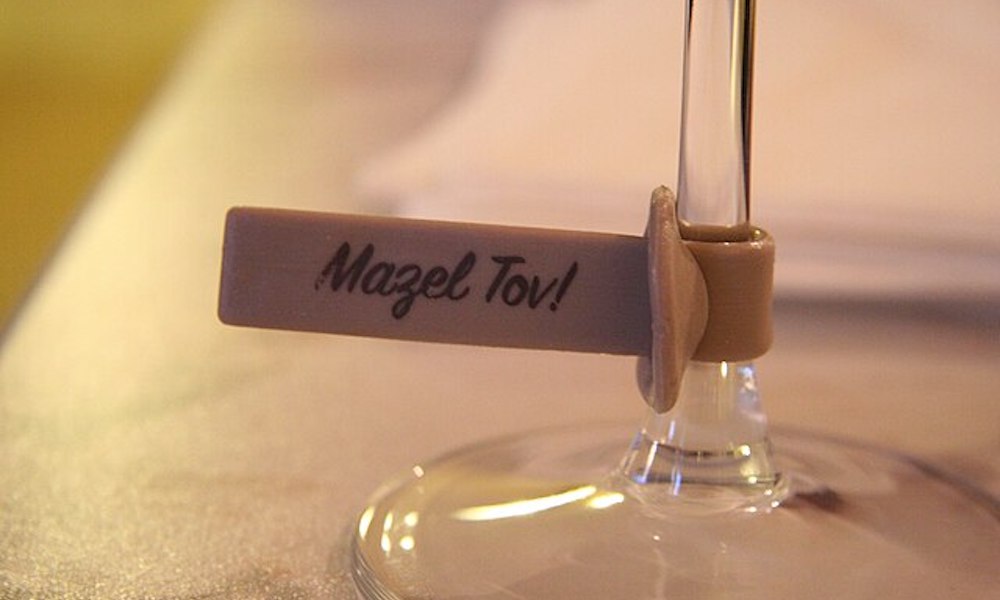
As part of Moment’s 50th anniversary coverage, we’re republishing content from the first issue, May/June 1975. In this piece, Sharon and Michael Strassfeld explain the meaning of Jewish congratulatory phrases like mazal tov, b’simon tov and yasher koach. To see this article in its original context, click here.
The constriction of the Jewish vocabulary is nowhere more apparent than in the status of mazal tov as the sole surviving congratulatory phrase of Jewish interchange. Herewith, an effort to recapture, to expand, to help recreate an idiom rich in nuance, precise in intent. Speaking the following phrases for the first time, the speaker who has known only mazal tov may feel rather ou est la plume de ma tante-ish, words to blush by. But by the sixth (or twenty-third) time the words are spoken, the eye will twinkle, the words will be purred. At which point, es kumt dir a mazel tov.
These several phrases are just a sample of the expressions available to us. Just as we can try to expand our vocabulary when congratulating others, so we can quite easily expand our vocabulary for greetings. Thus, “hi” is about as empty and overused as can be. How much more interesting to greet someone with shalom, which means, of course, “hello,” “peace,” and “good-bye.” (Thereby allowing you to begin, continue and end a conversation all at once.) Slightly more expansive is shalom aleichem—or, in effect, the same to you.
A classier greeting for someone who has returned after a significant absence is baruch haba—”blessed is the one who comes.” Responding in courtly fashion, the one to whom such a greeting is extended will say baruch hanimtza—”blessed is the one already present.”
With these several phrases, you should be able to get pretty far. There is one phrase reserved for celebrating anniversaries we have saved for last. Ihr zolt sich alteren in oysher un in koved—”may you age in wealth and in honor.” In celebration of the beginning of this new venture in Jewish life, we say to the readers and editors, zollen mir zich alle elteren tzusammen in oysher un in koved!!! May we all age together in wealth and honor!
Mazal tov!?!
Mazal Tov: An abbreviation for “let this happen under a good sign of the zodiac.” While the rabbis of the talmudic period decried magic and superstition, they did believe that the stars were influential in determining one’s fate. Accordingly, mazal tov began as a way of extending good wishes for some anticipated event. It has since, obviously, come to mean something closer to “congratulations,” referring to an event that has already taken place.
In its Hebrew pronunciation, the accent in mazal is on the second syllable, which rhymes with “doll.” In its more common Yiddish pronunciation, the accent is on the first syllable, and the spelling becomes mazel.
Mazal tov can be used sarcastically—as, for example, when a reckless taxi driver gets you home in one piece. Be suspicious if someone says it to you at an unlikely moment.
B’siman tov: Closely related to mazal tov, b’siman tov retains the original meaning of both, as an expression of good luck rather than congratulations. It is used particularly at betrothals. Among Sephardic Jews, it is not uncommon to find the letters samech tet underneath the signature on a piece of correspondence. Some people suppose that they stand for siman tov, in much the same way as some Jews will place the letters bet hey (b’esrat haShem, or God willing) at the top of a letter. In fact, however, the samech tet used by Sephardic Jews stands for s’fardi tahor—a “pure” Sephardi.
B’sha’ah tovah: Literally, “in a good hour.” This is the Hebrew equivalent of the widely used Yiddish, “in a guter sho.” It is used chiefly to express congratulations for the inception of a project whose completion is yet to cow me—as, for example, upon learning of a pregnancy, or of plans for a new magazine. A similar expression is, zol sayn mit mazel—may it be with fortune.
Yasher koach: Or “y’asher kochacha,” Literally, “may your strength increase,” an expression of felicitation when one has performed a particularly impressive task with success. Thus, hen a physician completes a complex operation, or a scholar a profound lecture, it is appropriate to say yasher koach. The same expression is used when a person has successfully fulfilled any of the special tasks associated with the worship service, such as reciting the brachot (blessings) over the Torah, or even opening the Ark. It is the proper phrase with which to congratulate a new bar or bat mitzvah. It would not be appropriate, however, at the conclusion of a wedding ceremony, since wishing the bride and groom increased strength may imply some doubt about their capacity. At weddings, mazal tov is exactly correct.
Bis hundert un tzvantzik: The Yiddish form of ad me’ah v’esrim, literally, “til a hundred and twenty,” A birthday congratulation, derived from the years of Moses. (Lately, some have taken to saying biz hundert un drei-un-tzvantzik—”until a hundred and twenty-three.” Why the extra three years? So you shouldn’t die suddenly.
